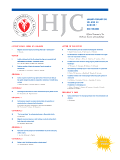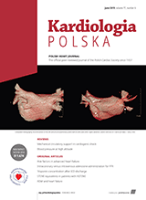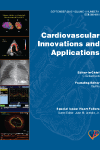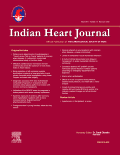
Hellenic Journal of Cardiology
Scope & Guideline
Advancing Cardiovascular Knowledge for a Healthier Tomorrow
Introduction
Aims and Scopes
- Cardiovascular Disease Management:
The journal publishes studies and reviews on the management of various cardiovascular diseases, including coronary artery disease, heart failure, arrhythmias, and valvular heart diseases. - Innovative Therapeutics and Interventions:
Research on novel therapeutic approaches such as transcatheter interventions, pharmacological therapies, and surgical techniques is a key focus area, showcasing advancements in treatment methodologies. - Epidemiology and Risk Assessment:
The journal emphasizes research that investigates the epidemiology of cardiovascular diseases, risk factors, and population health metrics, providing insights into public health strategies. - Technological Advances in Cardiology:
There is a strong emphasis on the use of advanced imaging techniques and diagnostic tools, including echocardiography, MRI, and CT angiography, to improve patient outcomes. - Patient-Centered Care and Quality of Life:
The journal also explores the implications of cardiovascular diseases on patients' quality of life, including psychosocial factors and the effectiveness of rehabilitation programs. - Multidisciplinary Approaches:
Research reflecting a multidisciplinary approach to cardiovascular care, incorporating insights from genetics, nutrition, and psychology, is encouraged.
Trending and Emerging
- Digital Health and Telemedicine:
With the rise of digital health technologies, there is an increasing emphasis on telemedicine and remote monitoring, particularly in the context of chronic disease management and patient engagement. - Cardiovascular Implications of COVID-19:
Research exploring the cardiovascular effects of COVID-19, including myocarditis and long-term sequelae in recovered patients, has surged, highlighting the pandemic's impact on cardiovascular health. - Precision Medicine and Personalization:
The journal is increasingly publishing studies on precision medicine approaches in cardiology, including genetic profiling and personalized treatment strategies tailored to individual patient characteristics. - Mind-Body Interventions and Mental Health:
There is a growing interest in the intersection of cardiovascular health and mental well-being, with studies focusing on the impact of psychological interventions on heart disease outcomes. - Innovations in Cardiac Imaging:
Advancements in cardiac imaging technologies, including 3D echocardiography and novel MRI techniques, are emerging as significant themes, with a focus on enhancing diagnostic accuracy and treatment planning. - Gender-Specific Cardiovascular Research:
Increasing recognition of gender differences in cardiovascular disease presentation and outcomes is driving research that addresses the unique aspects of cardiovascular health in women.
Declining or Waning
- Traditional Risk Factors and General Cardiovascular Risk Models:
There has been a noticeable decline in studies solely focused on traditional cardiovascular risk factors, such as hypertension and hyperlipidemia, as more sophisticated models incorporating genetic and lifestyle factors are gaining traction. - Basic Science Research:
The journal has seen a decrease in the publication of purely basic science studies, particularly those that do not have immediate clinical relevance or translational potential. - Single-Center Studies:
Research that is limited to single-center experiences is becoming less common, as there is a growing preference for multicenter collaborations that provide more comprehensive data. - Aging Population Studies:
Although still relevant, the frequency of studies solely focused on aging populations and geriatric cardiology appears to be waning, potentially overshadowed by the emergence of other high-impact topics.
Similar Journals

Cardiology Journal
Empowering global research in cardiology.Cardiology Journal, published by VIA MEDICA, stands as a prominent resource in the field of cardiology and cardiovascular medicine, with an ISSN of 1897-5593 and an E-ISSN of 1898-018X. Recognized for its Open Access model established since 1994, this journal facilitates widespread dissemination of critical research findings, allowing practitioners and researchers globally to access valuable insights without barriers. Based in Poland, with an address at UL SWIETOKRZYSKA 73, 80-180 GDANSK, it has achieved a respectable Q2 classification in 2023 for both Cardiology and Miscellaneous Medicine categories, reflecting its influence and quality within the scholarly community. With a Scopus ranking placing it at #117 out of 387 in Cardiology, it lies within the 69th percentile, underpinning its commitment to advancing knowledge in cardiovascular health. The journal’s converged years extending from 2006 to 2024 ensure it captures ongoing developments in a rapidly evolving field. As such, the Cardiology Journal serves as an indispensable platform for researchers, professionals, and students dedicated to exploring the frontiers of cardiac science and improving patient care.

Journal fur Kardiologie
Exploring the Heart of Cardiovascular Research.The Journal fur Kardiologie, published by KRAUSE & PACHERNEGG GMBH, is a pivotal resource in the field of Cardiology and Cardiovascular Medicine. With an ISSN of 1024-0098 and an E-ISSN of 1680-936X, this journal has played a significant role in disseminating valuable research and clinical studies from 1998 until its coverage discontinuation in Scopus in 2017. Despite its Scopus rank being relatively low at #316/324 in its category, it continues to serve as a platform for emerging cardiology research. The journal’s scope encompasses various aspects of cardiovascular health, providing insights that are crucial for researchers, professionals, and students alike seeking to advance their knowledge and practice in cardiology. While the journal is not open access, its contributions to the field are essential for those looking to stay informed about the latest developments in cardiovascular medicine.

Nepalese Heart Journal
Elevating Cardiology Practices in Nepal and BeyondNepalese Heart Journal, published by the CARDIAC SOC NEPAL, serves as a premier platform for disseminating knowledge in the field of cardiology and cardiovascular health. With an ISSN of 2091-2978, this journal aims to bridge the gap between researchers, clinicians, and academicians by presenting high-quality, peer-reviewed articles that address clinical practices, innovative research, and emerging trends in heart disease management, especially within the context of Nepal and the surrounding region. Although it operates under a traditional publishing model, its commitment to excellence aids in reinforcing the scientific discourse in an area critical to public health. The journal is a valuable resource for professionals and students alike who are focused on advancing their understanding of cardiology and its implications for health policy and practice. Exploring the intersections of local challenges and global advancements in heart health, the Nepalese Heart Journal is poised to contribute meaningfully to the evolving landscape of cardiovascular research.

Kardiologia Polska
Enhancing Cardiovascular Care with Every PublicationKardiologia Polska, the esteemed journal of the Polish Cardiac Society, has established itself as a vital resource in the field of cardiology and cardiovascular medicine since its inception in 1954. With an ISSN of 0022-9032 and an E-ISSN of 1897-4279, this journal serves as a platform for groundbreaking research and scholarly articles that contribute to the advancement of heart health. Although currently not an open access journal, it remains an essential reference for practitioners and researchers seeking to stay abreast of the latest developments in cardiovascular science. The journal reflects its scholarly depth through a Category Quartile of Q3 and a commendable Scopus ranking at the 48th percentile in its field. Published primarily in Poland, it caters to a global audience eager to explore comprehensive studies spanning clinical cardiology, innovative therapeutic approaches, and emerging cardiovascular trends. Join a thriving academic community by engaging with the invaluable insights and research contributions found within the pages of Kardiologia Polska.

Netherlands Heart Journal
Elevating Standards in Cardiology with Cutting-Edge FindingsNetherlands Heart Journal is a premier academic publication dedicated to advancing knowledge in the field of cardiology and cardiovascular medicine. Published by BOHN STAFLEU VAN LOGHUM BV, this journal has established itself as a critical platform for researchers, professionals, and students seeking to explore groundbreaking findings and innovative practices in cardiovascular health. With an ISSN of 1568-5888 and E-ISSN 1876-6250, the journal boasts a respectable Q2 ranking in the Cardiology and Cardiovascular Medicine category, placing it in the top half of its field according to the 2023 quartiles. The Scopus ranking places it 130th out of 387 in the relevant category, indicating a commendable percentile rank of 66th, which attests to its influence and quality of published research. Spanning from 2005 to 2024, the journal endeavors to include a diverse array of topics, encompassing clinical practice, technological innovations, and public health considerations related to cardiovascular diseases. Researchers and practitioners are encouraged to engage with the journal's robust content, contributing to and benefiting from the collaborative effort to enhance cardiovascular health worldwide.

Journal of Cardiovascular Development and Disease
Connecting global scholars in the pursuit of cardiovascular excellence.Journal of Cardiovascular Development and Disease, an esteemed publication by MDPI, has been a dedicated platform for disseminating cutting-edge research since its inception in 2014. Based in Switzerland, this Open Access journal not only provides unrestricted access to its content but also fosters global collaboration among scholars focusing on cardiovascular health and disease development. With an impressive focus classified as Q1 in Pharmacology, Toxicology and Pharmaceutics for 2023, it attracts a diverse range of interdisciplinary research, supporting advancements in pharmacological applications relevant to cardiac conditions. The journal's ongoing convergence through 2024 highlights its commitment to the evolving landscape of cardiovascular research, making it a vital resource for researchers, professionals, and students alike who are keen to contribute to and learn from significant developments in this critical field.

Cardiovascular Innovations and Applications
Connecting researchers and practitioners to elevate cardiovascular medicine.Cardiovascular Innovations and Applications is a premier open-access journal dedicated to advancing knowledge in the field of cardiovascular medicine. Published by COMPUSCRIPT since 2016, this journal provides a platform for the dissemination of innovative research and applications that address crucial topics in cardiology, aiming to bridge the gap between clinical practice and cutting-edge research. With an ISSN of 2009-8618 and an E-ISSN of 2009-8782, it operates on a global scale, facilitating access to high-quality content without financial barriers. The journal is positioned within the Medicine - Cardiology and Cardiovascular Medicine category, and its current Scopus rank of #321/387 reflects its potential for growth and influence in the academic community, being in the 17th percentile. Researchers, healthcare professionals, and students will find Cardiovascular Innovations and Applications an invaluable resource in their quest for the latest findings and advancements in cardiovascular health and treatment methodologies.

Pakistan Heart Journal
Exploring the Frontiers of Heart Health Research.Pakistan Heart Journal, with the ISSN 0048-2706 and E-ISSN 2227-9199, is a premier publication by the Pakistan Cardiac Society, dedicated to advancing the field of cardiology and cardiovascular medicine. Established as an Open Access journal since 2011, it provides a valuable platform for researchers and clinicians to disseminate innovative findings and insights within this critical area of health. Based in Karachi, Pakistan, at the National Institute of Cardiovascular Diseases, this journal aims to foster an enriched understanding of cardiovascular health by publishing rigorous research, case studies, and review articles. Despite its current categorization as Q4 in the latest 2023 quartiles and a rank of 357/387 in the Scopus database, it plays a vital role in the academic community, encouraging collaborative efforts and dialogue among professionals. The journal aspires to converge diverse perspectives and innovations in cardiology from 2019 to 2024, thereby enhancing the quality and scope of cardiovascular research in the region and beyond.

HEART AND VESSELS
Pioneering Research in Heart Health and Vascular FunctionHEART AND VESSELS is a prominent peer-reviewed journal published by SPRINGER, dedicated to advancing the fields of cardiology and cardiovascular medicine. With its ISSN 0910-8327 and E-ISSN 1615-2573, this esteemed journal encompasses a broad range of topics pertinent to heart health, vascular function, and associated therapies, making it an essential resource for researchers, clinicians, and healthcare professionals alike. Based in Japan and operating since 1985, HEART AND VESSELS has consistently maintained a Q2 ranking in the 2023 category quartiles, highlighting its relevance and impact in the cardio domain. Although it does not offer open access, the journal ensures high-quality publications that contribute significantly to the academic and clinical understanding of cardiovascular health. With over three decades of continuous scholarly contribution, HEART AND VESSELS serves as a vital platform for disseminating cutting-edge research and fostering innovative practices in the management of cardiovascular diseases.

Indian Heart Journal
Pioneering Insights in Cardiovascular MedicineIndian Heart Journal, published by Elsevier, is a distinguished peer-reviewed journal dedicated to the field of cardiology and cardiovascular medicine. Founded in 1961, this journal has been a pivotal resource for researchers, healthcare professionals, and students, providing a platform for innovative studies and insights into heart health. The journal transitioned to an Open Access model in 2013, ensuring widespread dissemination of vital research findings to enhance global understanding of cardiovascular diseases. Ranked in the Q3 category for Cardiology and Cardiovascular Medicine in 2023, it holds a reputable position in the medical community, with a Scopus rank of #222 out of 387 journals in the same field, placing it in the 42nd percentile. The Indian Heart Journal strives to foster advances in clinical practice and research while addressing the unique cardiac health challenges faced in India and beyond.